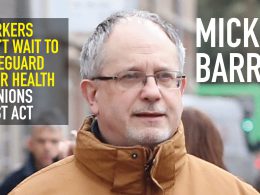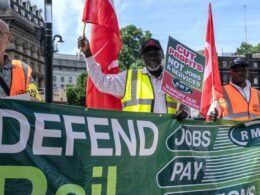By Stephen Boyd
TRADE UNION activists in the public sector have reported widespread anger at Brian Cowen’s draconian pay cut of €1.4 billion. Amongst lower paid public sector workers there is seething anger at the scale of the pay cuts, which will leave them struggling to make ends meet.
In a letter sent to all SIPTU branches, Jack O’Connor, General President stated “By now it will be clear to all that we are faced with one of the most serious assaults ever launched against working people in this country. The Government, with the active encouragement of Fine Gael, has announced a dramatic pay cut across the Public Service under the guise of a so called “Pensions Levy”. This is part of a strategy designed to drive pay cuts across the entire economy as an alternative to devaluation.”
Unfortunately for SIPTU members, Jack’s letter goes downhill after this, and tragically would leave the reader to draw the conclusion that SIPTU’s leadership are preparing for defeat. Rather than focusing on how the public sector unions could mobilise the country’s 360,000 public sector workers into a united campaign to defeat the governments’ pension levy/pay cut, they are discussing the need for a “Social Solidarity Pact”.
The position of the SIPTU leadership is stated by Jack O’Connor in this further extract. “Our response must focus on what is good for our society as a whole, not just resisting the imposition of the levy. We must promote the alternative concept of the “Social Solidarity Pact”. This must entail a contribution by all sectors of society in accordance with their capacity to do so ….. Make no mistake about it, there must be a contribution by working people irrespective of whether they are employed in the Private or Public Sector, but this must be applied fairly and equitably on the principle of ability to pay.”
The Socialist Party completely rejects Jack O’Connor and the ICTU leaders’ call for a “Social Solidarity Pact”. The recession was created by the employers, the banks, the property speculators and the right wing political establishment. The working class should not have to carry the burden of this crisis.
The government, ably aided and abetted by the capitalist media, has spent months preparing the ground for this cut in public sector workers’ pay. They have collectively attempted to sow division amongst the working class, by trying to divide public and private sector workers.
It is now taken as established fact in the media that it is somehow morally wrong for a public sector worker to have job security and a pension that isn’t dependent on the vagaries of the stock market. Attempts have been made to turn private sector workers against public sector workers in an illogical and twisted blame game as if a public sector worker’s pension rights are the cause of the recession or the huge redundancies at Dell or Waterford Crystal!
Fianna Fail, Fine Gael and IBEC’s answer of course (and their real agenda) is to drag down the wages and conditions of public sector workers to that of the lower paid sections of the private sector. A furtherance of their “race to the bottom” agenda for wages and working conditions – with the sole purpose of increasing the profits and wealth of the super-rich.
These arguments should be completely rejected, as should the arguments of Jack O’Connor and David Begg. There can be no “social solidarity” between the working class who are bearing the brunt of the recession and the bosses. Social solidarity between Michael Dell, worth $17 billion, and the 1,900 Dell workers he is throwing on to the dole, or the billionaire Tony O’Reilly and the Waterford Crystal workers – the idea is perverse!
Cowen’s government is leading this country into an economic and social catastrophe. Cutting public sector workers’ pay by €1.4 billion, increasing taxes and charges on the working class will further deflate the economy and deepen the recession.
This is only the beginning of the attacks. This pay cut is being made in the context of ?2 billion cuts this year. It is projected that a further ?14 billion cuts are on the cards in the next four years. If the union leaders do not lead a serious fight against this pay cut, then Cowen and his government will come back for more and more.
Public sector workers can stop these pay cuts. There are 360,000 public sector workers, the vast majority of whom are unionised. The public sector unions should follow the lead of the CPSU. Reflecting the anger at this attack from low paid civil servants, they are balloting for industrial action with the aim of taking strike action against the government.
As a start, a one day strike by all public sector workers would bring this country to a standstill and send Brian Cowen a clear and coherent message that public sector workers are not going to pay for the crisis that the capitalist class created.







